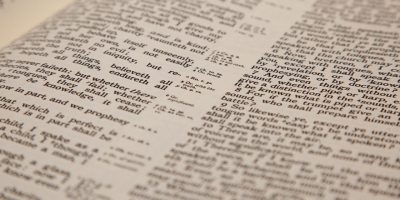The Book
of Job
summaries and outlines

Book Summary
Job is perhaps the oldest book of the Bible. Set in the period of the patriarchs (Abraham, Isaac, Jacob, and Joseph), it tells the story of a man who loses everything—his wealth, his family, his reputation, his health—and wrestles with the question, “Why?”
The book begins with a heavenly debate between God and Satan, moves through three cycles of earthly debates between Job and his friends, and concludes with a dramatic “divine diagnosis” of Job’s problem. In the end, Job acknowledges the sovereignty of God in his life and receives back more than he had accumulated before his trials.
[Source: NASB Charles Stanley Life Principles Bible Notes, Copyright © 2020 by Thomas Nelson. All rights reserved..]

Title
The name of the book comes from its central character. The English name is derived from the Latin Iob, from the Greek Iōb, which was the transliteration of the Hebrew Īyōb. The meaning of the name is uncertain..
[Source: NKJV Study Bible, Copyright © 1997, 2007 by Thomas Nelson. All rights reserved..]

Author and Date of Writing
The author is uncertain. The name of the author is not indicated in the book. That Job himself could not have written all of it is shown by the inclusion of the record of his death (42:17). Some have suggested that Moses wrote the account. This hypothesis would explain its inclusion in the canon, but it is mere speculation.
[Source: NKJV Study Bible, Copyright © 1997, 2007 by Thomas Nelson. All rights reserved..]
Job Outline
I. Prologue (chs. 1–2)
- Job’s Happiness (Job 1:1–5)
- Job’s Testing (Job 1:6-27 and Job2:1-13)
- Satan’s first accusation (Job 1:6–12)
- Job’s faith despite loss of family and property (Job 1:13–22)
- Satan’s second accusation (Job 2:1–6)
- Job’s faith during personal suffering (Job 2:7–10)
- The coming of the three friends (Job 2:11–13)
II. Dialogue-Dispute (chs. 3–27)
- Job’s Opening Lament (Job 3:1-26)
- First Cycle of Speeches (chs. 4–14)
- Eliphaz (Job 4:1-21 and Job 5:1-27)
- Job’s reply (Job 6:1-30 and Job 7:1-21)
- Bildad (Job 8:1-22)
- Job’s reply (chs. 9 & 10)
- Job Replies: There Is No Arbiter (Job 9:1-35)
- Job Continues: A Plea to God, Job 10:1-22
- Zophar Speaks (Job 11:1-20)
- Job’s reply (chs. 12–14)
- Job Replies: The Lord Has Done This (Job 12:1-25)
- Job Continues: Still I Will Hope in God (Job 13:1-28)
- Job Continues: Death Comes Soon to All (Job 14:1-22)
- Second Cycle of Speeches (chs. 15–21)
- Eliphaz Accuses: Job Does Not Fear God (Job 15:1-35)
- Job’s reply (Job 16:1-22 and Job 17:1-16)
- Bildad (Job 18:1-21)
- Job’s reply (Job 19:1-29)
- Zophar (Job 20:1-29)
- Job’s reply (Job 21:1-34)
- Third Cycle of Speeches (chs. 22–26)
- Eliphaz (Job 22:1-30)
- Job’s reply (Job 23:1-17 and Job 24:1-25)
- Bildad (Job 25:1-6)
- Job’s reply (Job 26:1-14)
- Job’s Closing Discourse (Job 27:1-23)
III. Interlude on Wisdom (ch. 28)
- Job Continues: Where Is Wisdom? (Job 28:1-28)
IV. Monologues (29:1—42:6)
- Job’s Call for Vindication (chs. 29–31)
- His past honor and blessing (Job 29:1-25)
- His present dishonor and suffering (Job 30:1-31)
- His protestations of innocence and final oath (Job 31:1-40)
- Elihu’s Speeches (chs. 32–37)
- Introduction (Job 32:1–5)
- The speeches themselves (Job 32:6—Job 37:24)
- First speech (Job 32:6-22 and Job 33:1-33)
- Second speech (Job 34:1-37)
- Third speech (Job 35:1-16)
- Fourth speech (chs. 36–37)
- Elihu Extols God’s Greatness (Job 36:1-33)
- Elihu Proclaims God’s Majesty (Job 37:1-24)
- Divine Discourses (38:1—42:6)
- God’s first discourse (38:1—40:2)
- The Lord Answers Job (Job 38:1-41)
- The Lord Answers Job. cont. (Job 39:1-30)
- The Lord Answers Job. cont. (Job 40:1-2)
- Job’s response (Job 40:3–5)
- God’s second discourse (40:6—41:34)
- The Lord Challenges Job (Job 40:6-24)
- The Lord Challenges Job, cont. (Job 41:1-34)
- Job’s repentance (Job 42:1–6)
- God’s first discourse (38:1—40:2)
V. Epilogue (42:7–17)
- God’s Verdict (42:7–9)
- Job’s Restoration (42:10–17)
Adapted from: NIV Study Bible Notes, Fully Revised Edition, Copyright © , 2013 by Thomas Nelson.
References and Sources:
The Feast of Esther (Feest van Esther, 1625) by Jan Lievens, North Carolina Museum of Art.
By Jan Lievens – Google Art Project, Public Domain, https://commons.wikimedia.org/w/index.php?curid=41035398